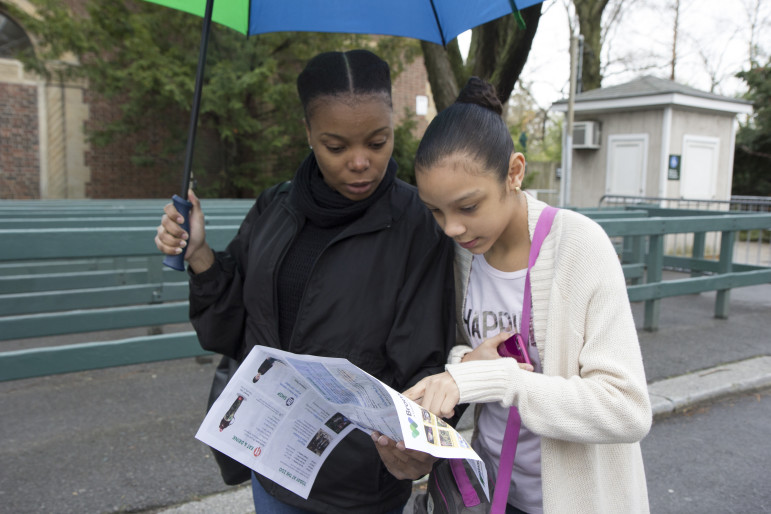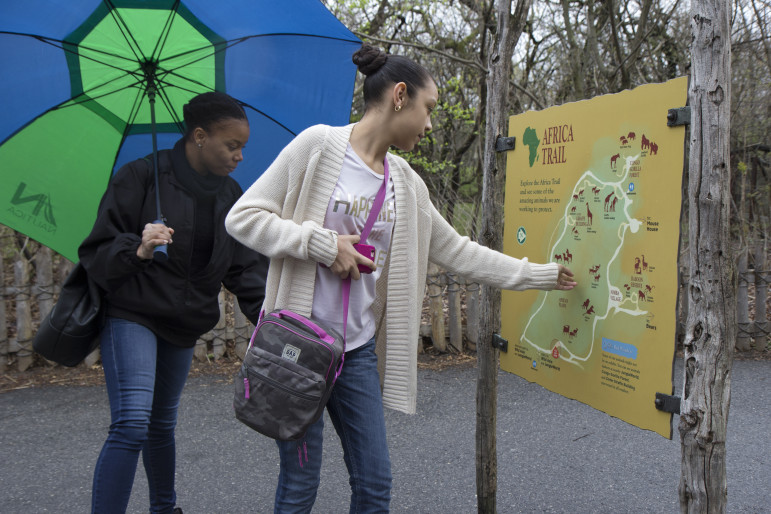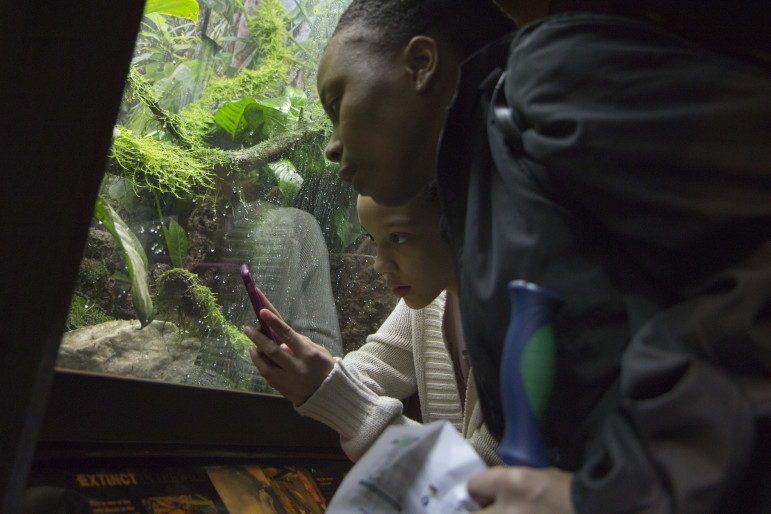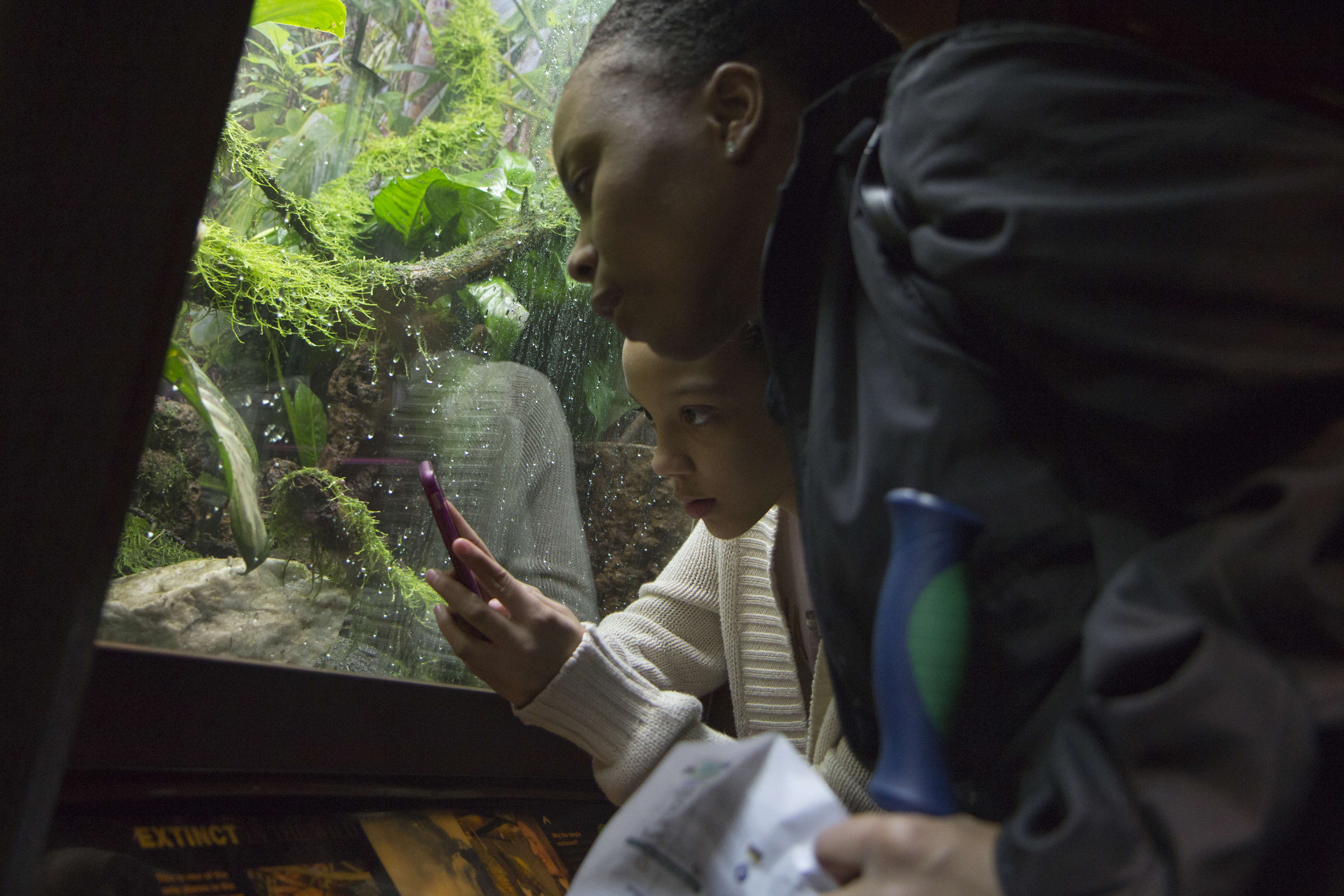
Photos by Nomin Ujiyediin
Nathalie Joseph Jean, left, and her mentee Amaya Lopez, right, visit the Bronx Zoo on one of their monthly outings. Joseph Jean, 29, and Lopez, 12, were matched through Big Brothers Big Sisters of New York City, which is trying to recruit a greater diversity of volunteers.
NEW YORK — Four years ago, Lillian Pucha, 28, was balancing schoolwork with raising three children in the Bronx. Her oldest, Brandon, was 7 years old, and Pucha wanted a strong male presence in his life.
 “I really wanted him to feel like a little brother,” she said. So she and Brandon contacted Big Brothers Big Sisters of New York City, a nonprofit organization through which adult volunteers can become part-time older siblings to children.
“I really wanted him to feel like a little brother,” she said. So she and Brandon contacted Big Brothers Big Sisters of New York City, a nonprofit organization through which adult volunteers can become part-time older siblings to children.
After a couple of phone calls with Big Brothers Big Sisters, Pucha waited for a response. But she didn’t get one for four years, until she reached out to Big Brothers Big Sisters in person at an event in a South Bronx restaurant a few weeks ago.
Brandon is now 11, and Pucha says his application to Big Brothers Big Sisters has just been approved. He’s been placed on a waitlist, where Pucha was told he could stay for up to six months before finding a mentor.
Brandon’s stepdad is often working, and his mom is busy with an internship and classes at John Jay College of Criminal Justice. Above all, she wants Brandon to have what she didn’t. “I was a teenager, a teen mom, and I really didn’t have that guidance,” Pucha said.
 Brandon is one of more than 100 children currently on Big Brothers Big Sisters’ New York City waitlist. About 80 percent of the children on the waitlist are boys, and 31 percent come from the Bronx, where the organization is hoping to expand its outreach.
Brandon is one of more than 100 children currently on Big Brothers Big Sisters’ New York City waitlist. About 80 percent of the children on the waitlist are boys, and 31 percent come from the Bronx, where the organization is hoping to expand its outreach.
Armed with a $400,000 grant from the New York City Council and the Department of Youth and Community Development, Big Brothers Big Sisters is improving its relationships with community organizations and planning events in an effort to reach larger numbers of volunteers and more diverse ones. Its ultimate goal: to find and serve more children in more neighborhoods, especially in the city’s outer boroughs of the Bronx, Queens, Brooklyn and Staten Island.
In the past fiscal year, only 74 of 2,180, or 3 percent, of New York City volunteers hailed from the Bronx, according to an internal Big Brothers Big Sisters report. Of the New York City volunteers, 921 — fewer than half — were people of color, and 916 were male.
In contrast, 1,109 children referred to the organization last year were Bronxites, more than a quarter of total referrals, said Diego Romero, director of community outreach in New York City. Three-quarters of them are boys, and 95 percent of children served by the organization are black, Latino or Asian.
While mentors and children are not paired solely on the basis of race, Romero said that shared life experiences can often enhance a match. “Our kids look like New York City, and so we want our volunteers to do the same,” he said. “It’s a really valuable experience, especially in the beginning of the match relationship, for there to be some common bond that they can build.”

Nathalie Joseph Jean and her mentee, Amaya Lopez, decide which parts of the Bronx Zoo to explore. Joseph Jean is one of only three percent of New York City Big Brothers Big Sisters volunteers to hail from the Bronx.
Osterman Perez, a Bronx native and attorney who has mentored a child, now 17, for the past eight years, said matching children with mentors of the same background can be helpful, especially if the children or their families speak a foreign language. But he doesn’t think it’s a requirement for a strong relationship. “Some of my best mentors, friends, teachers have been completely different backgrounds from me, and that’s actually been an eye-opener for me,” he said.
[Related: Innovative Ways to Engage Kids Displayed at National AfterSchool Association Conference]
Sometimes, parents want to match their children with mentors of the same race, said Greg Zweber, director of affiliate support for Big Brothers Big Sisters’ national office. “It becomes a challenge when there’s fewer volunteers of diverse backgrounds,” he said in a phone interview.
Nationwide, only 32 percent of children in Big Brothers Big Sisters in 2015 were white, while 69 percent of volunteers were white. Forty-five percent of children were male, while only 38 percent of volunteers were male.
More than 30,000 children are waiting for mentors in all 308 Big Brothers Big Sisters affiliates across the country. Most — 65 to 70 percent — of them are male. Zweber said it’s not uncommon for children anywhere in the country to spend six months or a year on their local affiliate’s waitlist.
He attributes the gender imbalance to female volunteers being more receptive to Big Brothers Big Sisters’ marketing campaigns. In addition, more boys than girls are referred to the program because most children in single-parent homes have single mothers, rather than single fathers, he said. “A lot of single mothers with boys are looking for that male role model in their life,” he said.
Mentoring in the Bronx
Diversity is an especially important goal in the Bronx, where the majority of the population is black or Latino, and many families live below the poverty line. But simply increasing the number of Bronx volunteers, regardless of race, can be a challenge.
Bronx resident Nilka Martell thinks the demographics of the borough made it difficult for Bronxites to commit their time. “If you’re an immigrant, you’re not going to volunteer. If you’re making ends meet, you’re not going to volunteer,” she said.
Earl Skinner, the youth programs manager at a Bronx nonprofit, attributes the lack of male mentors to a culture of masculinity that promotes materialism over altruism. “We measure success in terms of attainment of money or things. We don’t value success in terms of service,” he said.
Geographical diversity can also be a factor. “It’s hard to ask somebody who’s volunteering who lives in Manhattan to get out to Queens, the far end of Queens, or the far north stretches of the Bronx,” Perez said.
Outreach efforts
To reach more volunteers, Big Brothers Big Sisters has used funding to increase community outreach staff from two employees to five. The money has also been used for community events designed to attract potential mentors and establish stronger relationships with local elected officials and community organizations. These community leaders are the ambassadors for Big Brothers Big Sisters, often reaching potential volunteers through word of mouth and well-established connections, Romero said.

Nathalie Joseph Jean looks on as her mentee, Amaya Lopez, takes a photograph in the Bronx Zoo’s reptile house. According to Big Brothers Big Sisters, it’s easier to find female volunteers than male volunteers to serve as mentors for local children.
“It’s really being able to be a consistent presence in the community,” he said. “And it’s having somebody assigned to the borough [who] can build the trust with the local residents.”
In the Bronx, the next step is to expand the use of Big Brothers Big Sisters’ office in “the Hub,” a major commercial center in the Bronx where several busy streets intersect. The organization assigns social workers to interview all potential mentees and their families before matching them with a mentor.
Currently, the interviews are held in the Big Brothers Big Sisters headquarters in lower Manhattan, which means families in the Bronx might have to take bus or train rides lasting more an hour to get to the location. Romero wants to move the interviews to the Bronx office and to use the City Council funding to pay more social workers to conduct interviews.
The end result, he hopes, will be an organization that can better serve the children of New York City, regardless of where they live. “People may have heard of who we are, but they don’t really know what we do, where we do it, how we do it,” Romero said. “Even with a name like Big Brothers Big Sisters, it’s not always possible to get somebody to pick up the phone or return your call. But if you’re able to go to them, somewhere they’re comfortable, then hopefully the potential for collaboration increases.”
More related articles:
What Does Hair Have to Do With Reading and Writing?
Young Women Organize Around Day of the Girl to Highlight Issues






























